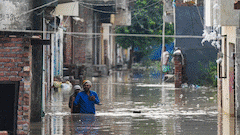Delhi Air Quality To Remain 'Very Poor' Over Next 3 Days, IMD Issues Red Alert For Severe Cold Wave Conditions
Delhi recorded ‘very poor’ air quality with AQI reaching 359 on Saturday. The AQI at Gurugram stood at 371 and around the Delhi University area was recorded at 351.

New Delhi: Delhi air quality will hover over the ‘very poor’ category owing to severe cold wave conditions over the next three days, news agency ANI reported.
According to India Meteorological Department (IMD), the declining air quality and the severe cold wave will add to the woes of the residents for the next three to four days. The weather office has also issued a red alert for Saturday.
“The AQI of Delhi-NCR, which saw some good air days in recent weeks, will slip back to the ‘very poor’ category in the next three to four days,” ANI quoted VK Soni, a scientist with the IMD as saying.
Delhi recorded ‘very poor’ air quality with AQI reaching 359 on Saturday. The AQI at Gurugram stood at 371 and around the Delhi University area was recorded at 351.
The AQI at Lodhi Road was 347, IIT Delhi 345 and IGI Terminal 3 was 356.
Noida reported alarming level of air pollution with AQI recorded at 433.
Meanwhile, IMD has predicted severe cold wave conditions over the next 24 to 48 hours in parts of North India, including the national capital. Delhi recorded a minimum temperature of 2 degrees Celsius on Saturday.
“The Delhi University’s Ridge area recorded a minimum of 1.5 degrees Celsius today, which is the lowest recorded this season,” RK Jenanmani, a weather scientist with IMD said.
Jenanmani further said that Delhi-NCR has been reeling under severe cold wave conditions and the temperature here is lower than many tourist places in sub-Himalayan region.
“The Western disturbance which was expected to break this cold spell, hasn’t ben too effective. A vast swathe of the North Indian belt, including Delhi, North Madhya Pradesh, North Rajasthan, Punjab and Western Uttar Pradesh, are colder than Shimla, Manali, and the Western Himalayan region where the minimum temperature has increased,” Jenanmani added.





































